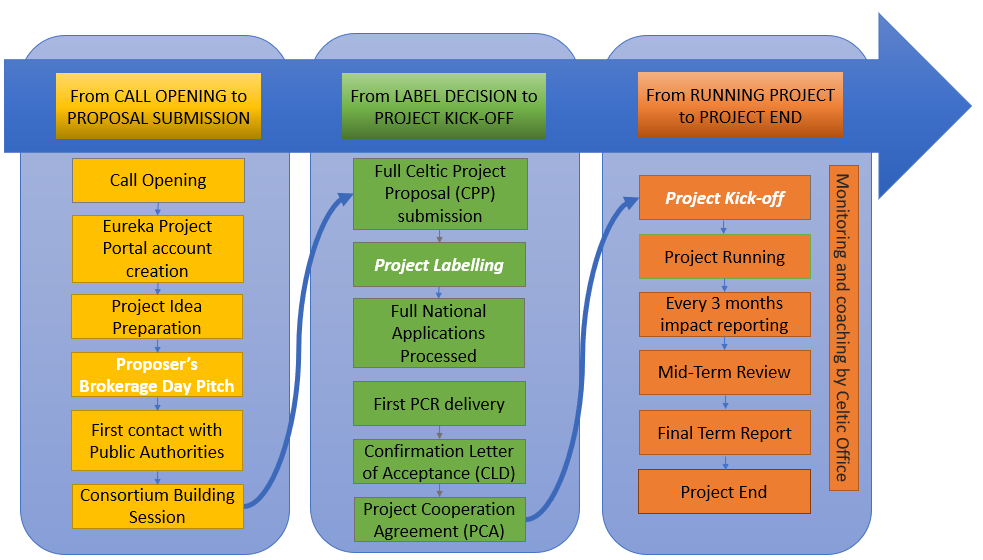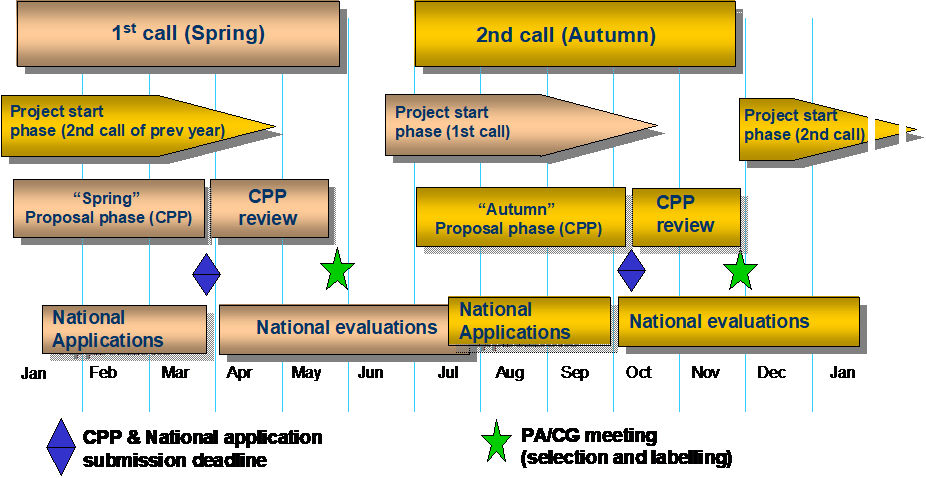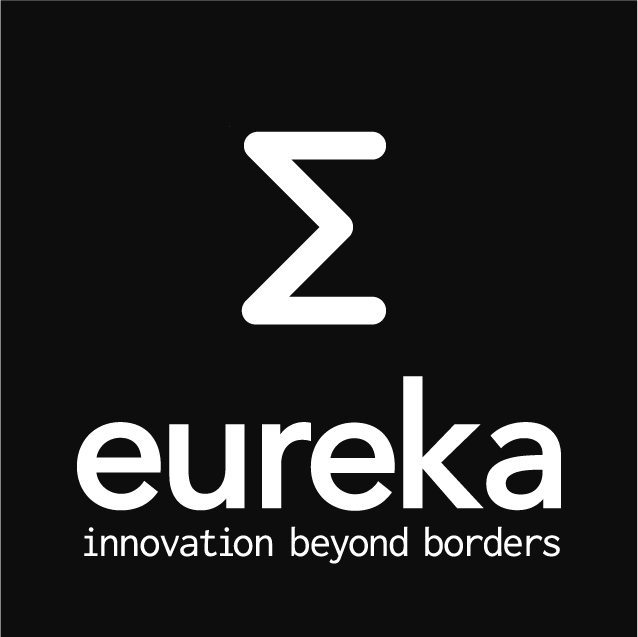About the CELTIC-NEXT Calls
CELTIC-NEXT calls are open to any company, large industry, small companies, universities and research organisations, and companies outside the EUREKA countries. Call proposals in CELTIC-NEXT have a high success rate for labelling – typically 50-60% of submitted proposals will become a running project. CELTIC calls engage a low management overhead that can easily adjust to new project situations. Furthermore, they are typically between 1 M€ and up to 70 M€ in the total project budget and include from 2 to over 50 partners. The typical project duration is between 24 and 36 months.
You need to register for the first time before you can submit your proposal. Please follow the Online Submission Tool instructions, fill in the Webforms in the Tool and upload your Project Proposal in pdf. You can update your Project Proposal any time until the deadline using your registered account.
There are 3 types of CELTIC-NEXT calls: bottom-up calls, flagships and ECP (Eureka Clusters Programme) Thematic Calls
-
Bottom-up calls
- 2 calls are organised each year, one in Spring and one in Autumn.
- Proposers are free to define their project proposal according to their own research interests and can submit it via our Online Project Portal.
Interactive map of Celtic-Next calls and projects
Click on the map to guide you through the cluster project process and navigate the website.

Second phase
This second phase will start after the label has been granted to the project by the Celtic Core Group and Office. The funding process by the PA must be completed as soon as possible, hence the first contact in the previous phase. All parties must sign the agreements, and the first PCR validation will launch the project's kick-off.
First phase
During this first phase, the proposers have the opportunity to prepare on their side before presenting to the Celtic Office and Authorities. With the Proposer's Day event, first informal pitch and review are made, giving the chance to participants and ideas to be shared and explored before the real CPP deadline.
Call Opening
Twice a year, a bottom-up call, spring and autumn calls, are open letting the opportunity to submit a project in the research areas of CELTIC and the current issues faced by Governments. Eureka Joint calls and flagships are also organised.
Learn more about our Calls & Have a look to our Research Areas
Eureka project portal account creation
The first step is to create a Eureka Project account to access tools and easily get guidance in proposing and building an idea. Update your Project Proposal any time until the deadline, using your registered account.
Project Idea Preparation
Proposers are free to define their project proposal according to their own research interests too and can submit it via our Online Project Portal.
Proposer’s Brokerage Day Idea Pitch
During our Proposer’s Brokerage Day for the call, take the chance to present your idea and expertise to attract funds and participants in your project.
First contact with Public Authorities
Get in touch with your national agencies as soon as possible (even before applying) to speed up the funding decision process. Remember that each project participant should contact their federal funding and follow specificities regarding each nationwide financing.
Consortium Building Session
Use the Brokerage tool to look at existing idea projects that could interest you, look for partners and expertise or even apply your own innovative idea.
Full Celtic Project Proposal (CPP) submission
Submit your Full Celtic Project Proposal by the deadline.
More help and information can be found in our Proposer’s Guide to guide step by step in launching your idea into a successful project.
Every guide and all call-related documents can be found here
Project Labelling
The evaluation of project proposals is made by the Group of Experts (GoE). The Celtic office organizes these project reviews and will then deliver or not the label according to the results.
Full National Applications Processed
The process of funding by the Public Authorities must be completed in this phase; hence the first contact made as earlier as possible.
First PCR delivery
The First Project Change Request must be delivered to the Celtic Office and your project coordinator within Celtic by the deadline. This first PCR shall include your modifications and improvements as requested in the labelling review recommendations.
Confirmation Letter of Acceptance (CLD/CLDoA)
The Confirmation Letter/Declaration of Acceptance (CLD) shall be filled in, signed for each consortium partner and returned to the office within two weeks after your proposal submission.
Project Cooperation Agreement (PCA)
After receiving a positive Label Notification, a Project Cooperation Agreement (PCA) should be elaborated and signed between the consortium partners.
Project Kick-off
The Kick-Off of a project is an essential boosting event to launch a project officially. This session allows participants, representatives from industry and public funding organisations, to share their visions and goals and present their work to the world.
Contact the Celtic Team to learn more about project Kick-Off
Last phase
This third and final phase of an ongoing project until its end will be completed with an impact report every 3 months from the participants to the Celtic Bureau, which will follow the project for a minimum of 3 years. In the mid-term, the project will be the subject of a mid-term review to be written. And at the end of the project, a final report will again evaluate its success, the allocation of its grant, and its operation until its end.
Project Running
When the two previous phases have been fully completed, the project is now active. The duration of a CELTIC project is approximately 3 years, but this period can vary depending on the project and other variables.
Every 3 months impact reporting
Every three months, project participants will have to handle an impact report to Celtic Office to keep informing the PA of the progress.
Mid-Term Review
Halfway through the project's life, a mid-term review will be requested from all participants to assess the project's progress and its resources and ensure continuity of success.
Monitoring and coaching by Celtic Office
The Celtic Office will be here to ensure a following-up of the project during its lifetime and for 3 years minimum.
Final Term Report
Before a project closure, the Group of Experts and the Celtic Office evaluate the project's last report to assess the outcomes of this research and future applications.
This is carried out to verify that the project achieved the goals laid down in the proposal and the project description.
Project End
Once a project ends, the Project Contract commits the participants to a CELTIC-NEXT Project session to finalise it so that all the expected project results are delivered and are of the agreed quality.
Learn more about why choosing CELTIC-NEXT to carry your project

Before applying
Some criteria are to apply when proposing; proposals need to:
- Be close to market and business needs
- Have at least two different partners from two different EUREKA countries for their project consortia (one must be a EUREKA Member Country and one another EUREKA Member Country or EUREKA Associated Country)
Before submitting your Project Proposal please check:
- Have you completed all required chapters in the Project Proposal Template (CPP)?
- Have you contacted all involved Public Authorities and followed their advice regarding national funding applications?
- Confirmation Letters signed by all partners should be submitted to office(at)celticnext.eu. You can send it 4 weeks after the call deadline.
Call-related documents and forms can be found here.
Proposals made have the possibility to be defined bottom-up, i.e. without the need to follow defined programme objectives; however, they must cover ICT-related research areas:
National funding and a smooth process
Projects can receive public funding, depending on the national funding rules, of up to 50%.
- To speed up the funding decision process, each project participant should contact their national funding agency early in the process and follow their advice regarding national funding applications in parallel to the proposal submission.
You may submit a short proposal abstract (including a short project outline, intended consortium partners/ countries) until one month before the deadline for a first check to the CELTIC Office.
After the Call
After the proposal assessments, the consortium will be informed if a CELTIC-NEXT label has been granted. With this label, the official funding applications and funding negotiations can start.
In case a proposal may not be accepted at the labelling meeting, it may have the opportunity to re-submit the improved proposal at the next CELTIC-NEXT bottom-up Call, like Spring or Autumn Call.
-
Flagship calls
- Those CELTIC-NEXT calls happen approximately every 3 years.
- The last CELTIC flagship project was AI-NET and was officially kick-off launched in Heidelberg on the 1st June 2021 with more than 150 online participants. Public authorities of Germany, Sweden and Finland, as well as representatives of the AI-NET project consortium, comprising major players from industry (large and SMEs), research organisations, and academia, presented the visions and goals of the ambitious European project aiming at ‘Accelerating Digital Transformation in Europe with Intelligent Network Automation’.
- The last Mid-Term review was held in Berlin as part of AI-NET event during April 27-29, 2022. It was the ANIARA Mid-Term Review, and in general, all national funding agencies and reviewers were happy with the results of the project in the first half and evaluated outcomes and achievement excellent. Jessica Svennebring, Vinnova representative for CELTIC-NEXT EUREKA CLUSTER confirmed that this type of projects will help building up valuable network between industrial and academic partners.
The Flagship process follows a different process, please contact Celtic Office to learn more.
-
EUREKA Clusters Programme (ECP) Joint Thematic Calls
- ECP calls aim to create innovative ecosystems that will enable advances in the State-of-the-Art and result in commercial and societal impact opportunities in the application areas addressed.
- Similarly to bottom-up calls, innovative projects are always welcome.
- Proposals should select the Cluster best aligned to the key technology focus area(s) in their proposal as this will allow the appropriate Cluster to provide the best level of technical support and knowledge to look after the proposal. If a project consortium considers that their project idea addresses two areas of Cluster expertise, they may select a second Cluster to jointly oversee their proposal. Both Clusters will share the responsibility for the proposal through evaluation and through its operational life as required. This facility is to ensure the appropriate technical competence is always on hand to evaluate and support the proposals for cross-knowledge purposes.
Each ECP Joint Call follows a different process, please go on the Eureka Clusters Programme to learn more.
USEFUL LINKS




